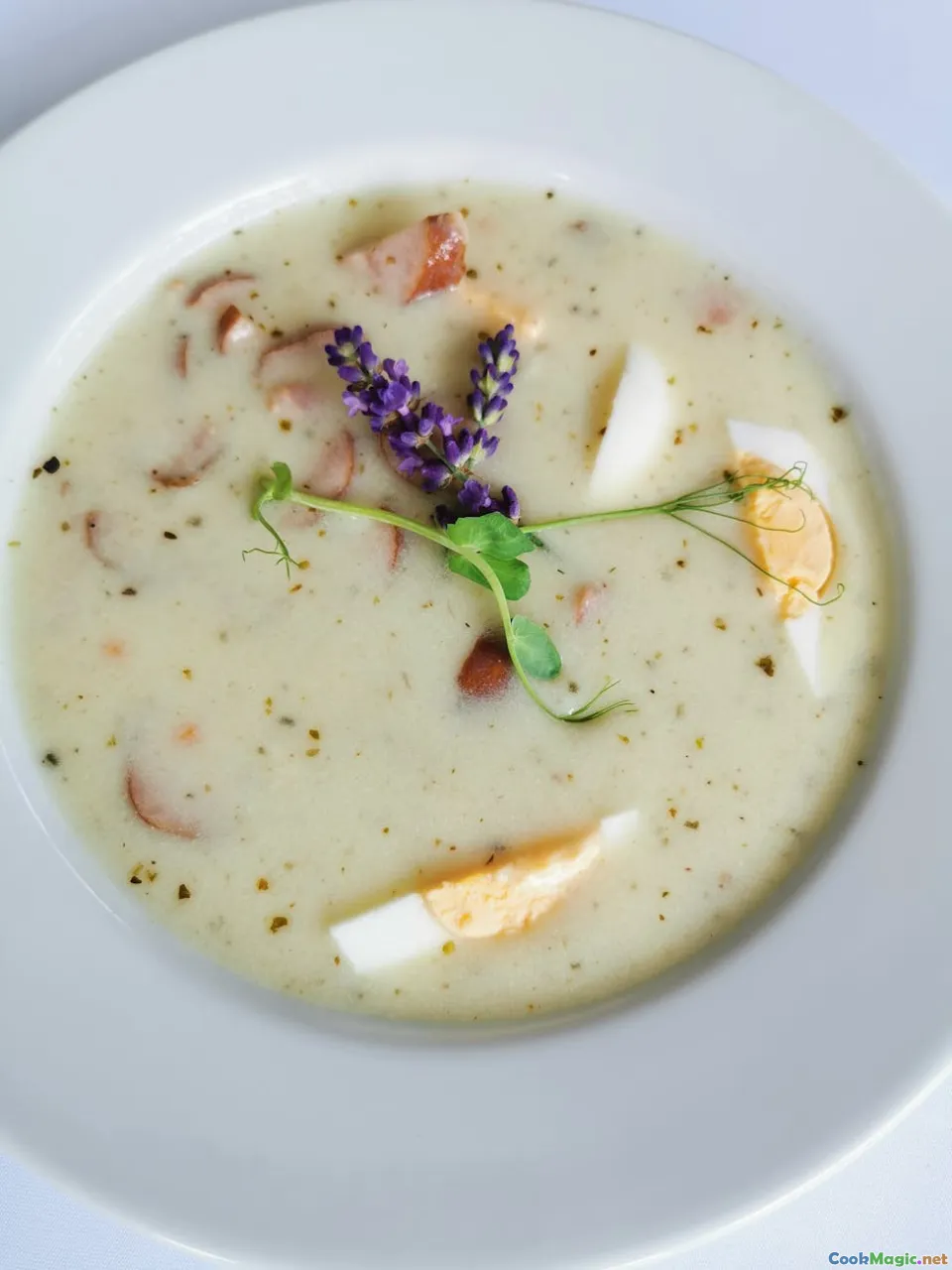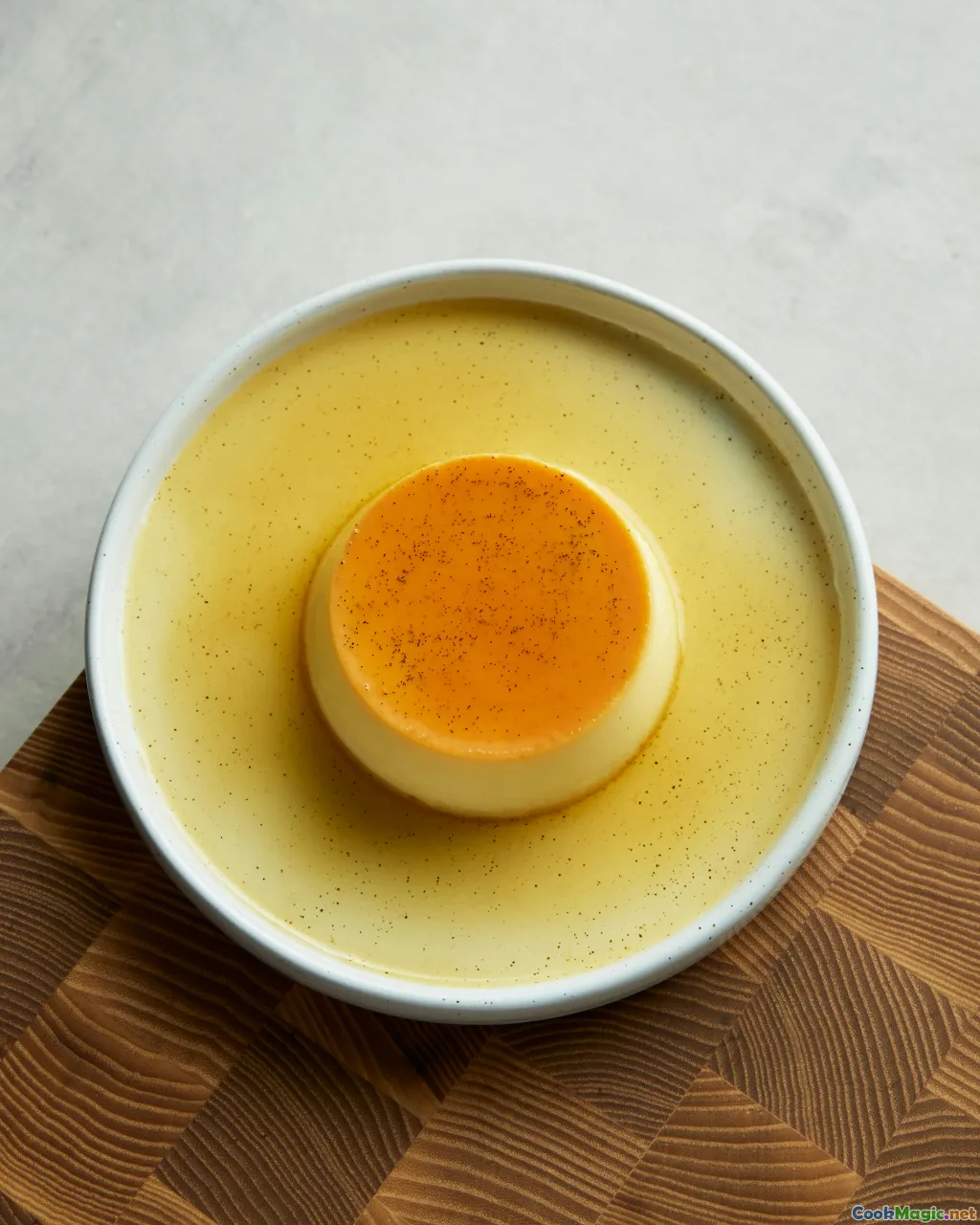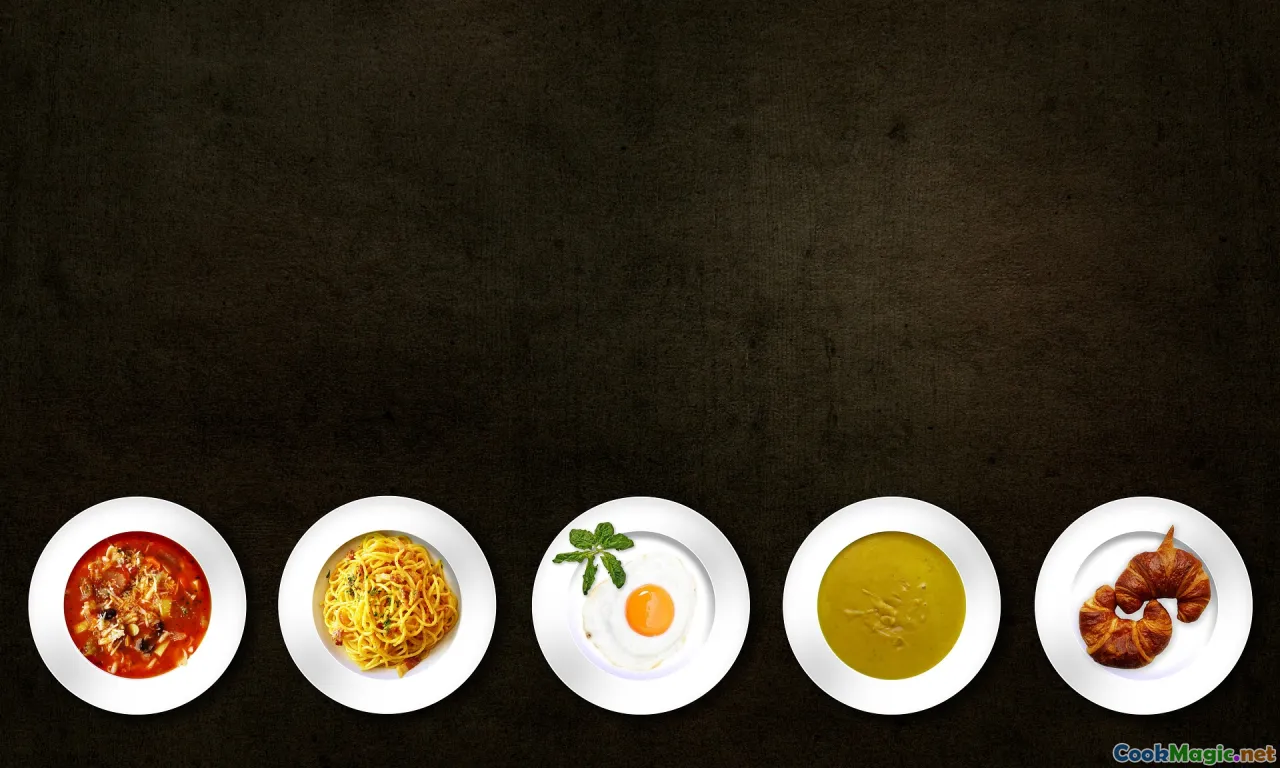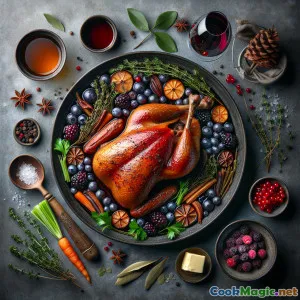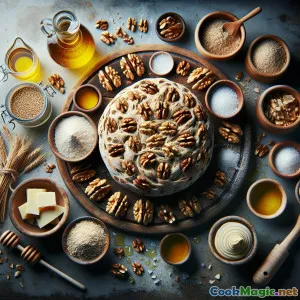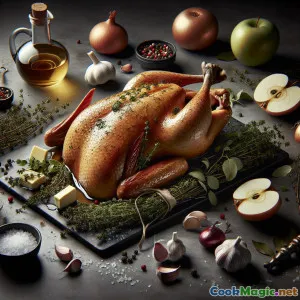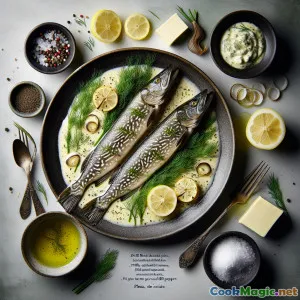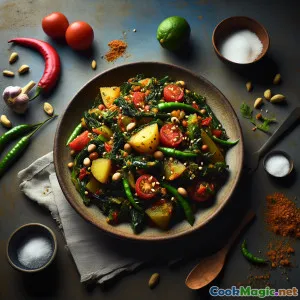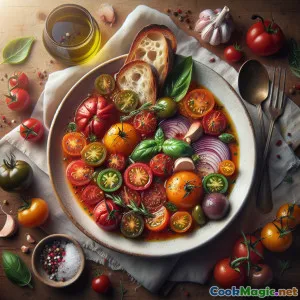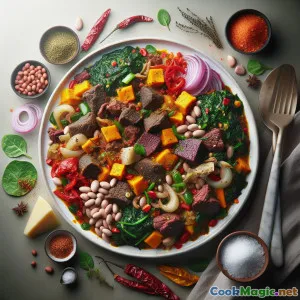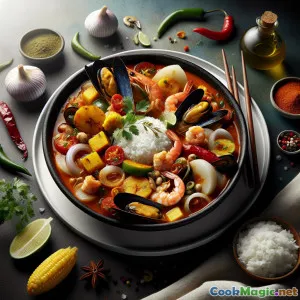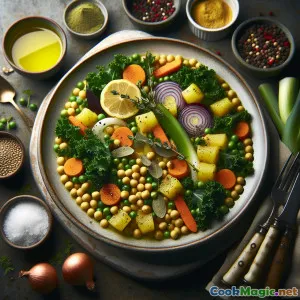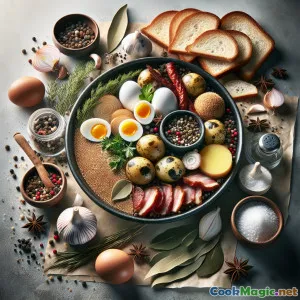
Деревенский ферментированный ржаной Żurek с золотыми перепелиными яйцами
(Rustic Fermented Rye Żurek With Golden Quail Eggs)
(0 Обзоры)0
3,059
июль 30, 2025
Сообщить о проблеме
Ингредиенты
-
120 grams Ржаная мука
(Dark rye, for sour starter)
-
600 ml Фильтрованная вода
(For fermenting flour and cooking)
-
4 cloves Чеснок
(Crushed, for sharp tang)
-
1 slice Кора белого хлеба
(Boosts fermentation)
-
2 leaves Лавровый лист
-
5 whole Ямайский перец
-
2 tsp Душистый горошек
(Dried herb; essential for authentic flavor)
-
80 grams Копченый бекон
(Cut into lardons)
-
200 grams Колбаса (польская белая или копченая)
(Sliced into thick coins)
-
8 whole Перепелиные яйца
(2 per serving)
-
2 medium Картофель
(Очистить и нарезать кубиками)
-
1 medium Лук
(Мелко нарезанный)
-
1 tbsp Свежий укроп
(Измельченный)
-
1 tsp Соль
(По вкусу)
-
0.5 tsp Чёрный перец
(Свежемолотый, по вкусу)
(Dark rye, for sour starter)
(For fermenting flour and cooking)
(Crushed, for sharp tang)
(Boosts fermentation)
(Dried herb; essential for authentic flavor)
(Cut into lardons)
(Sliced into thick coins)
(2 per serving)
(Очистить и нарезать кубиками)
(Мелко нарезанный)
(Измельченный)
(По вкусу)
(Свежемолотый, по вкусу)
Питательная ценность
- Порции: 4
- Размер порции: 1 миска (300мл)
- Calories: 370 kcal
- Carbohydrates: 38 g
- Protein: 18 g
- Fat: 17 g
- Fiber: 5 g
- Sugar: 3 g
- Sodium: 915 mg
- Cholesterol: 82 mg
- Calcium: 72 mg
- Iron: 2.4 mg
Инструкции
-
1 - Make Żurek Starter (Zakwas):
In a clean jar, mix rye flour, 400ml water, 2 crushed garlic cloves, and bread crust. Cover loosely and let ferment at room temperature for 1-3 days, stirring daily, until sour and bubbly.
-
2 - Prepare Stocks & Boil Potatoes:
In a large pot, combine the unsliced sausage, bay leaves, allspice, potatoes, and half of the onions. Cover with remaining water, bring to a simmer, and cook until potatoes are just soft.
-
3 - Fry Aromatics:
In a pan over medium heat, cook bacon lardons (if using) until crisp; add remaining garlic and onion, sauté until golden. Add all into the soup pot.
-
4 - Add Sausage & Pour Zakwas:
Remove whole sausage, slice, and return to pot along with sausage coins. Pour the fermented zakwas liquid (strained if preferred) into the soup; discard or compost solids.
-
5 - Season and simmer:
Add marjoram, salt, pepper. Simmer gently for 8 minutes, allowing flavors to meld. Taste; adjust seasoning or acidity by adding more zakwas or water.
-
6 - Cook Quail Eggs:
Gently lower quail eggs into boiling water for 2.5 minutes. Shock in ice water, then carefully peel and set aside for serving.
-
7 - Serve:
Ladle hot soup into bowls, garnishing each with two halved quail eggs and fresh dill. Enjoy immediately with rye bread.
In a clean jar, mix rye flour, 400ml water, 2 crushed garlic cloves, and bread crust. Cover loosely and let ferment at room temperature for 1-3 days, stirring daily, until sour and bubbly.
In a large pot, combine the unsliced sausage, bay leaves, allspice, potatoes, and half of the onions. Cover with remaining water, bring to a simmer, and cook until potatoes are just soft.
In a pan over medium heat, cook bacon lardons (if using) until crisp; add remaining garlic and onion, sauté until golden. Add all into the soup pot.
Remove whole sausage, slice, and return to pot along with sausage coins. Pour the fermented zakwas liquid (strained if preferred) into the soup; discard or compost solids.
Add marjoram, salt, pepper. Simmer gently for 8 minutes, allowing flavors to meld. Taste; adjust seasoning or acidity by adding more zakwas or water.
Gently lower quail eggs into boiling water for 2.5 minutes. Shock in ice water, then carefully peel and set aside for serving.
Ladle hot soup into bowls, garnishing each with two halved quail eggs and fresh dill. Enjoy immediately with rye bread.
Подробнее о: Деревенский ферментированный ржаной Żurek с золотыми перепелиными яйцами
Fermented Rye Żurek with Quail Egg: Polish Heritage In A Bowl
Polish “żurek” is an iconic sour soup made from fermented rye flour—a testament to the Eastern European tradition of naturally preserving and flavoring simple, rustic ingredients. Commonly enjoyed around Easter or in early spring, Żurek embodies frugality, resourcefulness, and the rich culinary history of Poland. Its base, a zakwas (sourdough rye ferment), is unfamiliar to most outside this part of Europe, yet yields a deeply compelling, tangy flavor rounded out by herbs and smoked meats.
A Story Steeped in Tradition
Żurek likely has medieval origins. Farmers found that grains left to ferment offered essential vitamins and acidity to enliven otherwise bland, winter provisions. The practice of fermenting rye dates before documented Polish statehood, creating a body-warming meal that persisted through centuries of change. Modern recipes may vary place-to-place; in Silesia, a heartier version includes white “biała” sausages, while in Kraków, garlic and minor tweaks prevail.
Adding quail eggs is a gentle elevation seen in celebratory contexts. These petite eggs, popular in various world cuisines for their subtlety and delicate texture, signal festivity and a gently refined touch.
Unique Aspects and Craft
Creating the zakwas (sour starter), lets bakers and homecooks flex their fermentation skills. Letting rye sour naturally, alongside a hunk of “country bread” and fresh garlic, builds nuanced acidity and life— the tanginess is the soul of żurek. Modern cooks may fear fermentation, but it’s easy and safe when basics are observed: use sterilized glass, filtered water, and maintain ambient kitchen temperatures (18–23°C).
A truly sumptuous Żurek is about modulation: taste the sour flavor as it develops before mixing it into the stew—some like it assertively sharp, while others gently mellow.
Cooking quail eggs is a unique opportunity; their subtle earthiness and soft yolk counter Żurek’s robust flavors. Peel with care: quail eggs cling to membranes, and patience pays off.
Serving Suggestions & Personal Thoughts
This soup showcases traditional Polish ingredients in new ways. For truly festive presentation, serve in a hollowed rye bread boule, letting the thick broth soak warmly through the crust. Pair with spicy horseradish or a spoonful of lightly sweet mustard, and dark beet kvass or a hearty pilsner on the side.
Leftovers improve over a day, deepening both umami and herbal clarity. If making vegetarian, omit bacon/sausage and focus on hearty potatoes and a touch more marjoram and garlic; the fermentation will carry the complexity.
Żurek, for me, is an essential comfort: it bridges winter to spring, old world to new, recalling family celebrations and slow hours in bustling Polish kitchens. Sharing it—bubbling, sour-savory, and topped with tender eggs—is an authentic journey into crafts of the past, and a taste still vibrant today.
Tips:
- Start with fresh, quality rye flour for best fermentation results.
- Allow at least 2–3 days for a fully-flavored zakwas, stirring daily.
- Add the sour liquid a little at a time, tasting as you go, for best balance.
- For extra garnish, add a dollop of sour cream or a sprinkle of rye bread croutons.
Żurek is demanding, yes, but deeply rewarding: in its quirky sourness, smoky sausage spice, and fluttering quail eggs, it catches the spirit of festive Polish hospitality.

